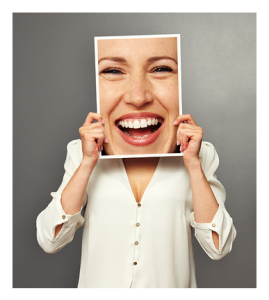Your smile. The nature of your smile. The nature of the act of smiling — as it is altered and you never noticed, as you caution yourself against assigning it a meaning, as you tell yourself it’s a silly discovery — shuffling through the drawer of photographs and beginning to compare, to remember, to relive.
 Some are Polaroids and others are drugstore-processed from the days before digitals and smartphones created remembrances tagged for virtual permanence in place of crimped edges, fading tints, the glossy surface.
Some are Polaroids and others are drugstore-processed from the days before digitals and smartphones created remembrances tagged for virtual permanence in place of crimped edges, fading tints, the glossy surface.
It isn’t the physical changes you notice so much as the brightness you cannot put a finger on, and then its absence which you can pinpoint at last as you lay out each likeness, careful with the chronology.
You recall your mother saying smile for the camera, smile because you look prettier, smile because pretty matters, smile so you don’t seem so serious though you are serious: You don’t want to smile when you have no cause, but you do because she insists and you learn that she is right.
You look prettier, and the world teaches you this daily lesson: pretty matters.
You smile brightly and unabashedly and confidently in the wedding album, and you smile broadly and wearily holding each newborn child. There are years of tentative smiling and relatively few pictures of you; your role is behind the camera, documenting for the next generation and the ones that come before. And you do this for the sake of the grandparents and the uncles, for the sake of the institution of albums, and for the promises of future family.
You smile when you move into a new home with your children, but it’s a murky smile and your eyes reflect fatigue; you are certain there is hopefulness as well, remembering those days with clarity; you convinced yourself it would be a new life, a good life, a better life, if you could just take things as they come. If you could just keep smiling.
Months later the smile becomes promotional — a gesture of public positivity — pinned up, pasted on, propaganda.
 There are years that follow when the smiles brighten but remain cautious as though wattage has been compromised, a flag lowered to half mast, a shadow cast across your eyes as much as your mouth. Yet your mouth is resolute in forming the requisite upward turn, however much it cradles darkness in its corners.
There are years that follow when the smiles brighten but remain cautious as though wattage has been compromised, a flag lowered to half mast, a shadow cast across your eyes as much as your mouth. Yet your mouth is resolute in forming the requisite upward turn, however much it cradles darkness in its corners.
There is a lover in the years after marriage who seems to narrate from a balcony in silvery light: “Your smile isn’t genuine,” he says. “You’re never quite in it. You’re poised, you’re posed, but you aren’t there.”
And so it follows that he asks, “Where are you?” as he stares at a series of photographs of the two of you together and you shake your head until he says “allow me” then takes the camera to prove his point. At the time of course you still cannot see, but now, on your computer, you begin to understand his meaning in the context of an array of expressions, the narrative of a visual timeline, the conspicuous ways of the mouth and the gaze in conspiracy and contradiction. You note the prudent, the politic, the watchful. You remember your mother’s advice.
In the night, you set up a tripod and a camera to test your theory in the quiet, illuminating the room in a golden glow and comparing new shots you take attempting to be at your best. You compare them to several captured only days before, a man’s arms around you, your laugh lines deepened, your grin un-self-conscious. In the newest images you are masked despite your most concerted effort to the contrary: Your teeth are no longer pearly, your bite is no longer perfectly aligned, yet what is revelatory in the recent candids is the ease in the nature of your smiling.
You May Also Enjoy
I love this for so many reasons. Let’s see if I can list a few.
1. I was always told to smile. Especially by older men and people who didn’t know me. I always looked “too serious.” Including to the school photographer who asked me if someone had died while taking my senior picture. Actually, my mother had, 3 months before.
2. I hate the camera.
3. I’m trying to forgive myself for not being “pretty” in the usual way.
4. Annie Liebovitz commented that she never asks her kids to smile for the camera and it made her sad the first time one of them cracked a fake smile.
5. My best smile? When one of my sons is behind the camera.
And I love your comment, Judith!